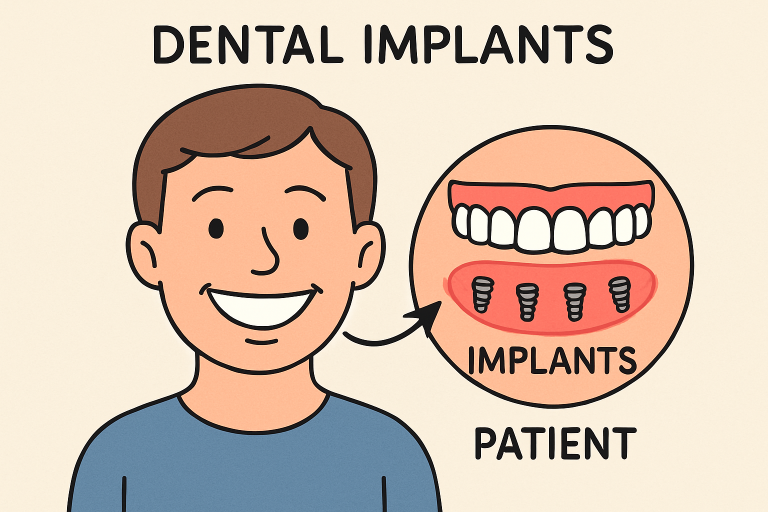The Truth About Full-Mouth Dental Implants
Introduction
Full-mouth dental implants are revolutionizing restorative dentistry for individuals experiencing significant tooth loss, offering exceptional durability, enhanced function, and a renewed sense of confidence and quality of life. With advancements in dental technology, these treatments have become more attainable and practical, appealing to a broader range of patients. Before committing to this comprehensive restoration, it’s essential to understand the techniques, benefits, and what the process entails from start to finish. For detailed insights and to explore customized treatment options, trusted providers such as ORA 4X offer expert guidance and support throughout every stage—from consultation to recovery—at sites like www.ora4x.com/dental-implants/full-mouth-dental-implants/.
Taking the time to learn about the procedure can help you feel confident in your decision, whether you are replacing teeth due to injury, illness, or long-term decay. Addressing concerns around risks, recovery, cost, and patient satisfaction is essential for establishing realistic expectations and maximizing the long-term benefits of your dental investment.
What Are Full-Mouth Dental Implants?
Full-mouth dental implants involve replacing every tooth in the upper or lower arch, or sometimes both, with prosthetic teeth anchored securely by dental implants. This treatment is typically recommended for people who have lost most or all of their natural teeth due to advanced gum disease, significant tooth decay, or severe dental trauma. By using a series of strategic implant placements, dentists can provide a permanent, stable foundation, often surpassing the functionality and appearance of traditional dentures.
See also: How to Choose the Right Electrical Company for Your Home
Benefits of Full-Mouth Dental Implants
- Durability: Implants are designed to last decades with appropriate care, even a lifetime.
- Enhanced Function: Patients regain their ability to chew thoroughly, enjoy a varied diet, and speak naturally.
- Natural Appearance: Modern prosthetics mirror the look and feel of natural teeth, restoring confidence in your smile.
- Bone Health: Implants stimulate the jawbone, preventing bone loss and sunken facial features often linked with traditional dentures.
Unlike removable dentures, full mouth dental implants do not shift or cause irritation, making everyday activities like eating and laughing effortless and comfortable. According to the latest insights from The Economist, advances in digital dentistry continue to improve outcomes and patient satisfaction for full arch restorations.
Potential Risks and Complications
Despite their high success rates, there are some risks to consider with full-mouth dental implants:
- Infection: Surgical sites must be carefully monitored to prevent post-operative infections, especially in patients with immune disorders or diabetes.
- Implant Failure: Some implants may not integrate fully with the jawbone due to poor bone quality or underlying medical conditions.
- Nerve or Tissue Injury: In rare cases, improper placement can cause tingling, numbness, or chronic pain.
Thorough pre-operative screenings and close collaboration with your dental provider help minimize these risks. Ensure your provider discusses your medical history, lifestyle, and bone health before recommending surgery.
The Procedure: Step-by-Step
- Comprehensive Consultation: Dentists assess oral health, bone density via imaging, and implant suitability.
- Treatment Planning: Any remaining diseased teeth are extracted, and the gums and bone are prepared.
- Implant Surgery: Titanium posts are embedded in the jaw, usually under sedation or local anesthesia for comfort.
- Healing and Osseointegration: Over several months, implants fuse naturally with bone tissue, creating a lasting foundation.
- Placement of Abutments: These connector pieces link the implant to the future prosthetic.
- Attachment of Prosthetic Teeth: Custom-crafted teeth are affixed to the abutments, finalizing your restoration.
Most modern clinics use digital planning and 3D guides for optimal safety and precision, resulting in faster, more predictable recoveries and outcomes, as Healthline notes.
Post-Operative Care and Maintenance
After the procedure, your dedication to oral hygiene and follow-up care will directly influence the longevity of your dental implants:
- Daily Care: Brush twice daily and floss around your implants to remove food particles and plaque.
- Regular Dental Visits: Professional cleanings and check-ups every 3–6 months are recommended to monitor healing and prosthetic integrity.
- Dietary Precautions: Initially, a soft food diet is advised. Avoid biting down on complex objects or using your teeth as tools.
Be alert for unusual pain, swelling, or bleeding, and contact your provider if concerns arise during recovery.
Cost Considerations
The investment in full mouth dental implants reflects the quality of materials, the expertise required, and the lasting transformation they provide. While initial costs may seem significant, many find the improved function, comfort, and confidence well worth it over time. Pricing is influenced by the geographic region, the complexity of your case, and the choice of prosthetic materials. Most clinics offer flexible payment plans and financing options to enhance affordability. For an in-depth look at what cost factors may apply and how to budget, the American Dental Association provides valuable dental care and funding resources.
Patient Experiences
Many patients experience a profound boost in their quality of life after receiving full-mouth dental implants. The adjustment period is typically brief, as most patients adapt quickly to the new feel of their teeth. Newfound confidence in eating, speaking, and socializing is often reported. Overcoming initial discomfort and patience during healing yields lasting, satisfying results. According to firsthand accounts and clinical surveys, even those initially hesitant about dental implants are often grateful for their restored function and appearance.
Making an Informed Decision
Opting for full-mouth dental implants is a significant decision that can dramatically enhance your quality of life, both functionally and aesthetically. Before moving forward, it’s essential to invest time in a detailed consultation with a qualified dental professional who can assess your unique needs and explain the process in depth. Seeking second opinions can offer valuable perspectives and help you make a confident, informed choice. Educate yourself thoroughly about the procedure’s benefits, potential risks, and necessary aftercare to ensure the treatment fits seamlessly with your health goals, lifestyle, and budget. Partnering with skilled, experienced providers increases the likelihood of successful results. It provides ongoing support throughout your journey toward achieving a healthier mouth, restored function, and a brighter, more confident smile for years to come.






